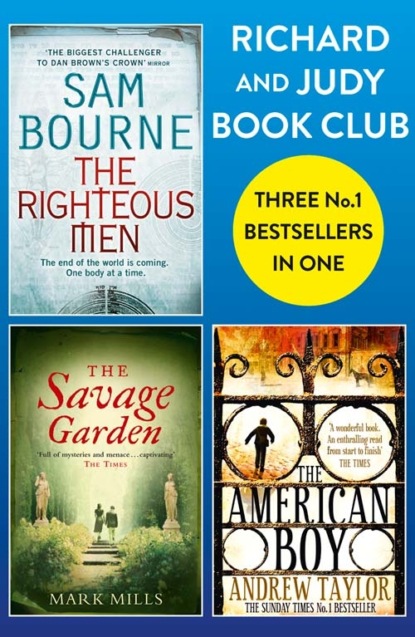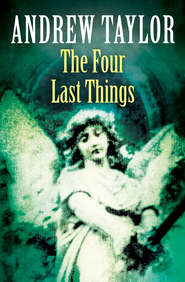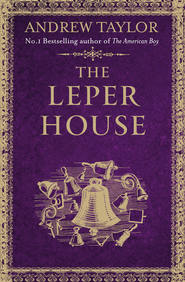По всем вопросам обращайтесь на: info@litportal.ru
(©) 2003-2024.
✖
Richard and Judy Bookclub - 3 Bestsellers in 1: The American Boy, The Savage Garden, The Righteous Men
Автор
Год написания книги
2018
Настройки чтения
Размер шрифта
Высота строк
Поля
“Mind you, Flora may have a point. Do you play chess or piquet? Whist?”
“Indifferently, I’m afraid.”
“No matter. You play – that is the main thing.” Carswall stared into his glass. “We exchange few visits in this part of the country.”
We drank in silence. A clock ticked. Whereas Mr Rowsell drank wine because he enjoyed it and its effects, Mr Carswall drank it as if it were his bounden duty.
“I did not wish to alarm the ladies at dinner,” he said after a while, “but this afternoon I received intelligence that there is a band of housebreakers in the vicinity. We must be on our guard. So it is no bad thing to have another man in the house, particularly a former soldier.”
The old man gnawed his lower lip for a moment and then bade me ring the bell. When the butler came, Mr Carswall ordered him to lock up with particular care. Then, to my relief, he gave me permission to go. I left him to his wine and his fire and went to the drawing room in search of tea. Only Miss Carswall and Mrs Lee were there, one on either side of the fire. Mrs Lee was asleep. Miss Carswall’s face was uncharacteristically sad, though she looked up with a smile when I entered and patted the sofa beside her.
“Sit down and have some tea, Mr Shield. I cannot tell you how pleased Sophie and I are to see you. Papa becomes quite bearish without masculine company. I am sure you will do an admirable job of drawing his fire. Isn’t that how you military men put it?”
I smiled back and said I would do my best. As I spoke, I glanced in the direction of Mrs Lee.
“You must not mind her,” Miss Carswall murmured. “Mrs Lee is very short-sighted and rather deaf: in other words, one could not ask for a better chaperone.”
“She is a near neighbour?”
“No. In fact, I had not met her before she came here on Tuesday. She seems most amiable, though, and I will not hear a word against her. It appears that all her relations are clergymen, which constitutes her principal charm in Papa’s eyes.”
I burst out laughing.
“But it is true,” she went on. “Papa feels that neither Sophie nor I is quite the thing, albeit for different reasons. He is anxious that we should be accepted in the neighbourhood, that we should take our proper position in society. Hence Mrs Lee. She has such a store of respectability that she cannot help but shed her surplus on those around her. She is a perfect paragon in every way, and one of her nephews was acquainted with Sir George Ruispidge when they were up at Oxford.” Her eyes gleamed in the candlelight. “Believe me, Mr Shield, there can be no higher recommendation.”
“I’m afraid I do not know of the gentleman.”
“What? How can this be? Sir George Ruispidge is our very own none-such. He lives nearby at Clearland-court. They say his rent-roll brings in six or seven thousand a year.” She looked down at her lap but I saw the smile on her face. “And the dear man has coal mines besides, as well as a charming house in Cavendish-square and a seat in Parliament. His family have been here for generations – they know everybody, go everywhere. So you will understand that we find him a most agreeable neighbour.” She raised her head just in time to catch me with an answering smile. “And the general opinion among the ladies is that he is a very handsome man, too.”
“And what is your view, Miss Carswall?”
Her eyelashes fluttered. “It would not be seemly for me to disagree with an opinion held so firmly by the majority of my sex, Mr Shield. But you may soon be able to judge for yourself. We may see the Ruispidges in church on Christmas Day. Certainly my father hopes so. He has a very pressing reason for wishing it.”
“And may I ask what that is?”
For an instant the skin tightened over the bones of Miss Carswall’s face. “Why, he hopes that Sir George will make an offer for me.”
Chapter 38 (#ulink_58a83b7f-0292-5a15-9822-ecec9b321af2)
Flora Carswall was her father’s child in more ways than one. Their virtues and their vices went hand in hand. Both of them spoke their minds, and both lacked cant; but both could also be shockingly frank.
Carswall was almost certainly wealthier than Sir George Ruispidge but the Ruispidges were one of the first families of the county, and had been for generations. One might say that Carswall wished to purchase a form of immortality by allying his family with them. No doubt he would have had no trouble in buying a gentleman, even one with a title, a man prepared to ignore the father’s mean birth and the daughter’s illegitimacy for the sake of the dowry she would bring. But it is human nature to desire what one cannot easily obtain. Carswall wanted a gentleman who was not on the brink of ruin, or already deep in that bottomless abyss. He wanted a gentleman who held his head high in the world.
So much I had already inferred, not merely from my conversation with Miss Carswall on the night of my arrival at Monkshill but also from what I knew of her father. What I did not then know was that there was another reason why Sir George Ruispidge was so pre-eminently suitable for the rôle of Mr Carswall’s son-in-law. Looking back, however, I realised that I received a hint of it on my very first evening.
I had left the drawing room and was climbing the stairs towards my own chamber when I heard a door close and footsteps above. At the head of the flight I met Mrs Kerridge. I presumed she had been attending Mrs Frant. I made some remark in passing about the size of this house relative to those in Margaret-street and Russell-square – a pleasantry, merely, suggesting that we had risen in the world.
“He can never rise high enough for this house,” Mrs Kerridge hissed. “Not for Monkshill – and he knows it.”
“I beg your pardon?”
She came close to me. “I spoke plain enough, did I not?”
“Who can never rise high enough? Mr Carswall?”
“Who else could I mean? All the other men in this house are servants.” She raised the candle she carried in her left hand and gave me a hard, considering look.
“Mrs Kerridge –”
She cut me off with a laugh. “None of our affair, though, is it? Master Charlie’s asleep, by the way – I looked in on him earlier. His friend was reading, but I made him blow out his candle.” She walked away from me, turning as she went to throw a few more words over her shoulder: “It won’t do you no good, you know, coming here. This place does no one any good. You should have stayed at that school of yours.”
Chapter 39 (#ulink_6ed00a4f-7461-5ca7-beb5-a1e481668e58)
The next day, Friday, was Christmas Eve. In the morning the two boys and I continued our long march through the Eton Latin Grammar. In the afternoon, we walked in the park. It was exceptionally cold that year. Everywhere the ground was hard and white with frost.
The mansion-house stood at the southern end of a ridge. The boys took me north along a path running up the ridge’s spine, which commanded a prospect of the river’s sinuous, shining curves beyond the turnpike road in the valley below. No expense had been spared to accentuate the picturesque nature of the spot. An obelisk surrounded by seats artfully constructed of rustic stone marked the highest point of the park and also the place where six paths intersected. We followed the widest of them, which led north-west and gently downwards to a small lake formed by damming a stream that drained down to the river. To the north and west, beyond the stretch of frozen water, lay dense woods.
Charlie pointed to the trees. “Mr Carswall has ordered the gamekeepers in the covers to shoot strangers on sight. There are poachers at work, he says, and some of them may be housebreakers too.”
Edgar stared at him. “Surely they would not dare come here?”
“What is to stop them? We can hardly send for a constable if we see them.”
The ways of great estates were foreign to me. But before I had been twenty-four hours at Monkshill-park, I had begun to suspect that something was wrong. The domestic economy of a large establishment should run as smoothly as Mr Carswall’s watch. A well-tended park should show everywhere the presiding hand of its owner. Monkshill was a splendid house, in a splendid park. There was no shortage of money. Yet it seemed to me that neither of the ladies had been entrusted with the direction of the indoor servants, and that the master did not care to interest himself in the estate.
Instead, Mr Carswall had hired people to do these things. This would not have mattered if he had ensured that those he had hired were doing their jobs. But everywhere one saw small signs of neglect: from the spots of grease on the footmen’s liveries to the gate with a broken hinge in the park palings. It was possible, I thought, that Mr Carswall was not habituated to the responsibilities of such an establishment. But I knew too much of his capabilities to believe that he could not have remedied the shortcomings, had he desired to do so.
It puzzled me at first. An older man would have seen the reason directly. Mr Carswall was old; he knew that his powers were declining; and he was husbanding his energies for a purpose I did not then understand.
Chapter 40 (#ulink_e3607130-782b-562d-b907-320f7bc2c802)
The Christmas Eves of my youth had left me with many happy memories. My father was a cool, grave, remote man who took no part in the festivities of the season. But my mother would take me to the house of an aunt. She had married a whitesmith and, though comfortable, the family was not in such prosperous circumstances as we believed our own to be. But on a single Christmas Eve in their house, there was more laughter than in ours the whole year round.
In my aunt’s kitchen, there was always a great sprig of mistletoe, and we boys had the privilege of kissing the girls beneath it; and for each kiss, a berry was plucked from the bush. This circumstance led to much frenzied arithmetic, for when all the berries had been plucked, the privilege ceased.
I spent my last Christmas Eve in Rosington at my aunt’s house. This was after my parents had died, when I was teaching at the grammar school. Fanny, the daughter of the school’s new master, had paid a visit. That day I kissed her for the first time, and it was underneath my aunt’s mistletoe bush. Usually the memory of her made me feel melancholy. Not this year, however – instead, the thought crossed my mind that if I had not kissed Fanny under the mistletoe five years before, I should not be at Monkshill-park today.
Not that Mr Carswall encouraged any sign that it was Christmas Eve in his house. Rustic festivities would have been out of place in this great stone block, this temple to modern taste. None of the chaste marble fireplaces was large enough to hold a Yule log, even if such a thing had been available.
That evening I was invited to dine again with the Carswalls, Mrs Lee and Mrs Frant. Mr Carswall brought the conversation round to the subject of church.
“I had a note from the Rector,” he said. “Sir George is bringing a party over from Clearland-court.”
Miss Carswall cast her eyes up to the ceiling. “How fortunate I purchased that new pelisse before we left town.” She glanced across the table at me, and I thought I saw amusement in her face, and an invitation to share it. “And will Captain Jack make one of the party? And their mama?”
“I do not know,” Carswall said. “I should think it likely.” His eyes slid from Miss Carswall to Mrs Frant, and then he turned to me. “You and Mrs Lee will join us. We have two pews. I think it proper that you should sit behind us with the boys.”
“Yes, sir.”











